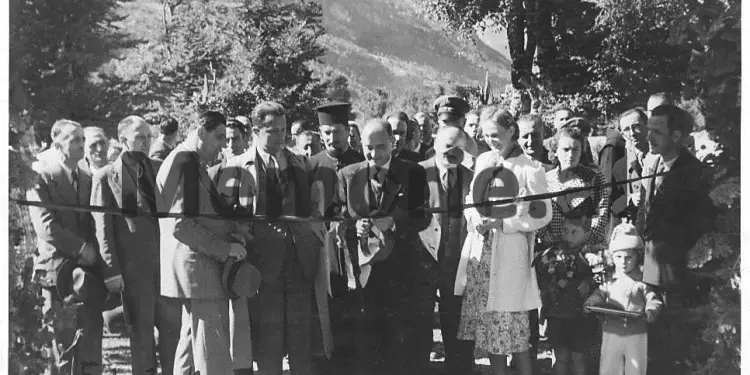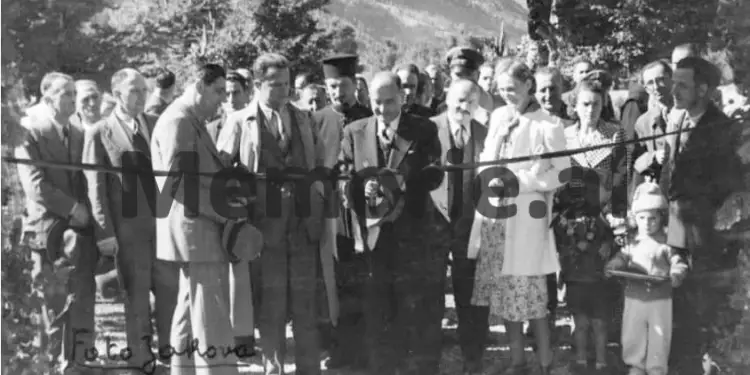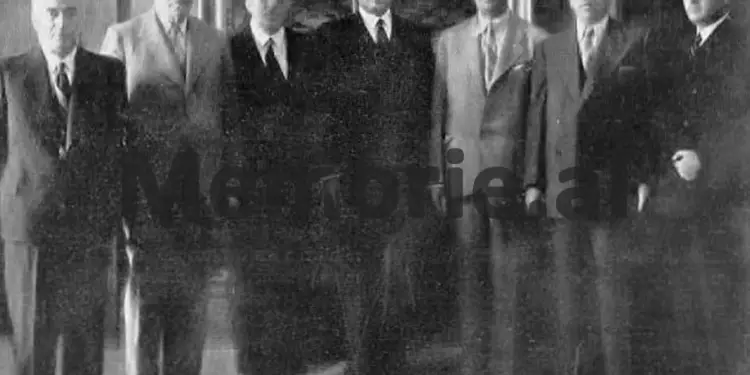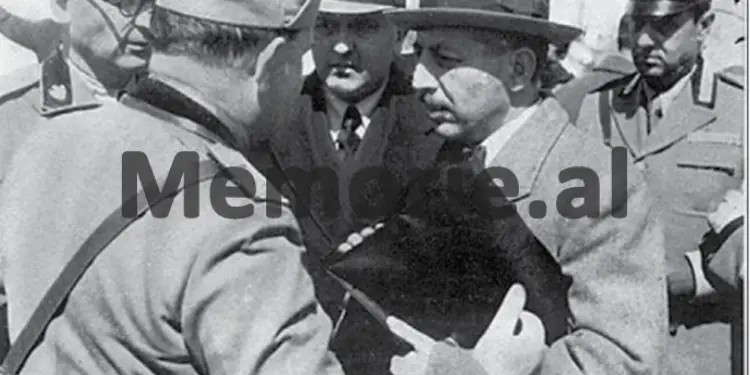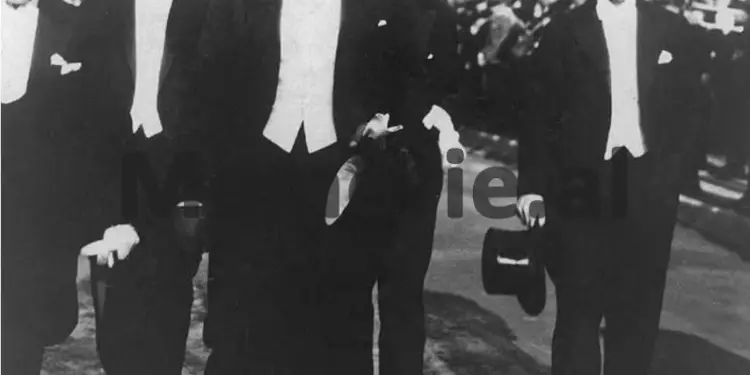By Arben Pustina
Part Eighteen
-Rrok Gera, a proper statesman –
Memorie.al / This article aims to convey to the public the image of a perfect man, who lived in other times, but who was the best example, not only of what an ordinary man can represent, but, next first, as an example of a noble, distinguished, omniscient and, above all, honest statesman. Having in his genes the noble virtues of his origin, being formed as a personality in a wonderful environment, such as Shkodra at the beginning of the 20th century, and graduating from one of the most prestigious universities in Europe, such as that of In Vienna, Rrok Gera had all the potential to be one of the important figures who gave rise to a rapid development through comprehensive reforms in Albania in the 30s of the last century.
This development reached its peak with the government of Mehdi Frashër, considered perhaps the best Albanian government of all time, formed for the most part by non-political persons, among who was Rrok Gera. For 10 years, or more, as a minister or in other high state functions, he worked with conviction that he was walking on the right path for the consolidation of the Albanian state, a process for which he said he had no time to lose. Economist, financier, diplomat, lawyer, Gera was a specialist who advanced towards the top with his professionalism in an environment where the old factions, which were almost dominant in politics and governance, lost ground in front of young and educated people good.
RROK GERA IN THE PERIOD OF THE OCCUPATION OF THE COUNTRY, 1939-1944
The dissatisfaction of the Germans is confirmed by Hubert Neuwirth, who, in his work “Stand and cooperation in Albania, 1939-1944”, writes that: “…the Germans did not like the expansion of the government with Zogist forces, they even expected that, one day, the powerful nationalist group under the leadership of Dines, sooner or later could openly fight the Germans as enemies”. Likewise, the historian Christoph Stamm emphasizes that the Albanians had not previously notified the German authorities about the formation of the new government, and that it was clear to Schliep that Mehdi Frashëri wanted to put the Germans before a ‘fait acompli’. The Germans were also angry because for the creation of the new cabinet, the new Prime Minister and Mehdi Frashëri removed Xhafer Deva from the game, strongly opposing the insistence of the Germans, who wanted the National Front to be represented in the new government and Kosovo.
This fact has also been emphasized by the Allied Intelligence Service. Reacting to the creation of the new government, Germany’s special envoy for Southeast Europe, Neubacher, in the telegram dated July 21, 1944, sent to the General Consulate of Germany in Tirana, wrote that: the Albanian authorities should be informed that the Germans could not allow the facts to be faced: “…Please make it clear to the competent Albanian authorities that we, from every Albanian state leadership, must demand that the fact that the German army is the only force be accepted regularly armed in Albania. Everything that has happened recently in the ways of the existence of the Albanian state must definitely be connected with our presence in this country. From this fact, the German request is understandable, that regarding the issue of government reorganization, we should not put before the committed acts. During personal changes in the government apparatus, we must maintain the right of opinion in relation to any personality whose loyalty could be important to us”.
Another testimony proving that the solution to the governmental crisis in Albania came without the intervention of the Germans comes again from Neubacher himself, this time through his memories of the Balkans: “…I experienced three weeks of an Albanian governmental crisis which I will not i never forget From this moment on, we did not recommend any candidate. Day after day, new combinations were made, information, counter-information, influences, and counter-influences. The famous political tyrants stuck out their heads and introduced themselves in the beautiful house on the ground floor where I had set up my headquarters in Tirana. Honorable friends came to the city and with their bodies, stayed at the beautiful hotel “Dajti”, built by the Italians, so that they would be nearby when the new Minister of Finance took over the post. The well-oiled rifles and machine guns of the guards of these dignitaries gave the hotel a martial appearance. Eventually, I pretended to have lost all hope of a quick resolution and flew out of the country without saying goodbye to anyone. I don’t know if this gesture had an impact on the situation, but shortly after my departure, the most disadvantaged of all, took the post: Fiqri Dine, a boy from Dibra. He had good relations with Abaz Kup, whose headquarters was under British control…”.
In some cases, it is written that Rrok Gera served during 1944 as an Albanian envoy in Berlin, but this does not hold and for this reason let us follow the course of events: Being interested in having security during their stay in Albania, the Germans left a lot of things in the hands of the Albanians and as a sign of this tendency towards a policy of neutrality, in the spring of 1944 they thought of raising the status of the consul general in Albania to the level of ambassador. After the relevant decision was taken, Rrok Gera was appointed to the post of Albania’s envoy in Berlin, but, as Bernd Fisher claims, Gera never de facto took this position, since on July 18, he was appointed to the post of minister of Finance. Even Christoph Stamm claims that: “…on July 12, 1944, the German News Agency announced that the government of the Reich had “formally” established diplomatic relations with the government of Albania, with the aim of further deepening friendly relations . Schliep was appointed the envoy of Germany in Tirana, and Rrok Gera was appointed as the envoy of Albania in Berlin, but it is clear that he did not receive this task”.
Despite the attitude of the Germans, the Albanian authorities continued to be persistent in their attitude to separate the powers from the Germans as much as possible. Another important fact is the decision of the Nalte Council, dated August 9, 1944, which, based on a government proposal, transferred all the powers of the Armed Forces in Albania to the Prime Minister: “…take into account that, various formations with a subversive character, led by interests contrary to our national interests, with weapons in hand, are endangering the public order, existence and future of Albania, we relied on articles 169 and 177 of the Basic Status, decided:
- That our armed forces of the State are concentrated in the National Defense Command, which for this occasion, takes the title of the Command of the P. of Active Powers and is directly related to the Prime Minister for all the effects of these actions; the prerogatives of the High Council remain unaffected, in terms of the disciplinary hierarchy of these forces. 2. Authorizes the Government to, for the realization of the pacification actions, take all the measures that will be called necessary and to prepare the relevant laws and, especially a Project[1] Law on the defense of the State, the provisions of which protect our toxic, political, social, economic and financial of the State”. Even this above decision, according to Neuwirth, “was taken without prior discussion with the angry Germans”. But in addition to politics, the economic and financial problems of the country were quite acute. Two weeks after assuming the office of Minister of Finance, on August 3, 1944, Rrok Gera forwarded to Prime Minister Dine, the project-budget for the financial exercise that included a nine-month period: from July 1, 1944 to March 31, 1945.
In this project, the revenue forecast was around fr. Albanian. 106,000,000, while the expenses for the civil and military administration totaled fr. Albanian. 176,000,000. Meanwhile, Minister Gera noted that there was a large amount to be paid by the previous government to the National Bank of Albania, as well as the fact that the State Finance was nearly two to three months behind with payments that, together with those of the Bank, they were about 36,000,000 fr. Albanian. In this way, the total deficit, predicted for the 1944-1945 budget, reached fr. Albanian 96,000,000. In Gera’s reserve letter, addressed to Prime Minister Dine, we don’t just find tables of budget figures, but we see reflected a catastrophic situation of Albanian finances, a situation that shocked even the minister himself, who, when he accepted the job, had not even, thought about it. I thought things would be so bad. Very easily, everyone can think that the war situation would be the reason for this, but in the finance minister’s letter, the war as a factor with a negative impact was clearly mentioned, only once.
According to Rrok Gerë, the financial situation of the Albanian state had to change immediately, otherwise there was a risk of going into complete anarchy: “…If such a financial situation is maintained, the State Finance, which today is almost two months behind with payments (on average), so from then on it would start with even more distance from the possibility of facing these payments. The consequences would be catastrophic, because abuses in the administration would increase, the public security apparatus would be misused by the agents of this security themselves, and thus, in the face of a very difficult internal situation, we would have the most complete anarchy. . As the cause of the bad financial situation, Rrok Gera determined in the first place the mentality that the civil and military administrations had at that time for big expenses and for inflated structures, while the taxpayers kept the traditional mentality of paying as little taxes as possible despite the opportunities they had:
“…The mentality of civil and military administrators who do not show any good will for savings: every employee and every officer wants to keep his position at all costs, no matter how much it shows that his service is not up to date necessary, just like every head of administration, protects the situation created around him, no matter how invalid (or at least not necessary) that administration is. The obsession of every administrator with doubling, tripling and multiplying his administration, at a time when for the smooth continuation of the work, half, a third and in some cases even a tenth of the good personnel would be enough. The good officers and soldiers on whom a heavy burden of work is placed, often associated with the risk of life, thus drive a crowd of colleagues who have no fame and no power, often enjoy salaries, rewards and services that are not privileged.
This fact has increased and increases immorality and destroys the administration. And this fact that I related above has greatly damaged the morality of the co-owner, who is asking himself: am I also paying in proportion to my husband’s ability to pay? Is it right for me to pay for non-essential services? Likewise, this neighbor claims to be given at least the minimum of security and peace. Of course, the community is also influenced by the social, economic and political crisis that we are going through, in addition to the traditional mindset that it has; pay me taxes as little as possible. The propaganda of the elements that are opponents of the state authority is also great in this direction. So on the one hand; we have the Administration with its mentality of spending mania, contrary to the mentality of the co-owner who does not want to pay.”
According to Minister Gera, the serious financial situation in the country had several other causes: “The situation is even more difficult because the Government has not taken any measures to correct the situation of the former foreign concessions in Albania in 9 months so from this source; we have neither income nor accurate notifications. We must also bear in mind that the Belgrade Protocols, with the unregulated state of the National Bank of Albania, could not be fully implemented and cannot be fully implemented due to the lack of banknotes, and thus due to the lack of liquidity of the Bank in question, we have also from this side, the counter-complaint. Dangerous factors for State Finances are the interventions of various Institutes and Entities that, by law or without law, certify, issue and spend various revenues that do not pass through the state budget and thus are not subject to any control, nor to as far as the issuances and expenses are concerned.
The favors created earlier in favor of some people of the groups that ask for a letter of marriage, salt, etc., outside the legal rules in force, also shake the base of the state income. In these circumstances, I feel it is my duty to present to Your Excellency, that the Department of Finance, which is such a delicate apparatus, is well equipped neither with the leading personnel who help the Minister nor with the personnel of the inspections, which should be very dense and equipped with the possibilities to mobilize all the state authorities, to confirm and issue the state revenues in an orderly and uncompromising manner, based on the laws that are in force”.
Even further, Minister Gera complained that quite different from the situation in which he had left the administration 5 years ago, when due to the Italian occupation he had left the government, at the end of July 1944, he had found in the Ministry of Finance an incompetent staff, which took about two weeks to present to the minister a report on the overall financial situation, although high work rates were required, as the budget should have been ready as early as July 1, meaning a month ago. But that was not all. The Minister of Finance was surprised and complained that he was not left alone, day and night, by a very large number of different people who asked him, directly or through friends, for transfers, liquidations of arrears, salary increases, reductions in taxes and duties. , they wanted to be given the opportunity to buy gold from the quantities that the German army had put up for sale through the BKSh, etc., etc.
In these circumstances, Rrok Gera presented to Prime Minister Dine, the immediate need to take radical measures, the implementation of which could improve the situation of State Finances, perhaps within three months, but this provided that the Financial Authority had the support full statement of the State Authority: “…The problem is therefore very urgent for: a) rapid radical savings measures in the civil and military administration. b) Quick and radical measures to increase state revenues and bring them into force. c) Solving the problem of the National Bank of Albania and foreign concessions. d) Equipping Finance with the bodies and authority necessary to ensure a more perfect service. e) Coordination of income and expenses of various entities and groups that think to avoid fiscal anarchy.
I must emphasize for the sake of the truth, that we signed it in the absence of 5 years from the administration, there was no clear notification of the aforementioned facts. For the sake of this truth, I must emphasize that it took me two weeks to receive a cursory notice of this situation, in the short time with which it must be acted upon and in circumstances of interventions that did not allow me to quiet neither day nor night, getting some sort of order in this situation, would need a time of at least three months, provided that the financial authority has the quick and unconditional support of the nationalized authority and all the people who want and they will support the public order, from which the situation of the Nation can be saved in the end. In difficult times like these, I must add that finance has an urgent need to have an important reserve fund to face the extraordinary expenses that have been proven in connection with the state of peace and war”.
Even in the letter of Rrok Gera, addressed to the Chairman of the Supreme Council Mehdi Frashëri, on August 9, 1944 (cited a little above), the same gloomy situation is described, especially as it pertains to the state of the Albanian administration: “…in these three weeks in which my activity was devoted to the study of the entire financial situation, I came to a very good conclusion: the Albanian state has an administrative and military apparatus that is in flagrant disproportion with the country’s contribution possibilities…” ! “…from this study, Your Excellency, the details of which I do not have the opportunity to sift through in this paper, I have formed the conviction that the Albanian State is under the heavy burden of a colossal Administration, built perhaps with a diabolical purpose those who want or wanted gave me the proof of the impossibility of saving this State with its own means…”! Memorie.al




